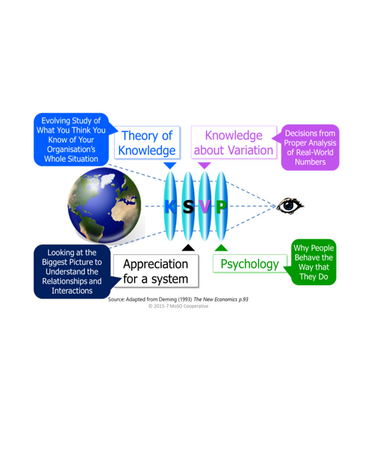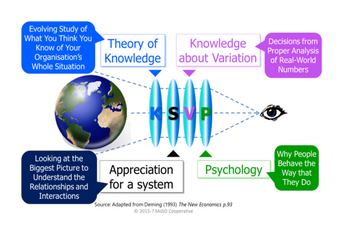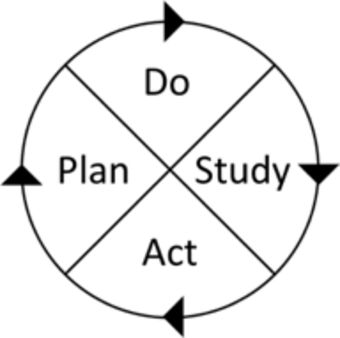
Deming Management for Quality (part 1): Knowledgology – Theory of Knowledge
Progress indicator
In the first of a four-part series on Deming Management for Quality, Alan Clark and Tony Korycki explore how Deming’s system of profound knowledge still applies to today’s organisations.
This article is the first in a series of four that expands upon what Dr W Edwards Deming called a system of profound knowledge (SoPK), which we introduced in the December 2017 issue of Quality World (see “The relevance of Deming for today’s management”, page 32). Whilst managers do not have to be experts in every field, they should be able to work with them all. Our intention is to help quality professionals, managers and their organisations develop a way of thinking about the way ‘work gets done’, to build sustainable success. Deming’s system of profound knowledge can be represented by the following diagram:

In our “The relevance of Deming for today’s management” article, we contend that SoPK is a key significant improvement in quality and management practice. Let’s start with the field of ‘theory of knowledge’.
Although it may sound academic, it is actually highly practical. Let us explain. Every organisation makes statements about future long-term goals, creates strategies, makes plans, takes decisions and, ideally, takes action on all of these. To be effective, these should be based on facts or evidence of each situation in its entirety, and SoPK helps to provide a complete view.
How often do you hear: “We’ve always done it this way”, “I’ve got a feeling that we should do this” or “We are going to do X (because I can get some personal gain or ego gratification)”? This is no way to run any organisation; that is, if the intention is to survive, let alone be sustainably successful. As Deming once said: “You don’t have to do these things. Survival is optional.” Let us look at a more effective way to succeed as an organisation, which should rightly be called management science.
We can imagine the response: “We are practical people who take action! What’s all this theory?” Put it this way: the theory of knowledge in your organisation should be the result of ongoing study to inform what you think you know or claim to know about your current reality or whole situation. In practice, theory is highly practical because the facts or evidence will have come from the actual experience of running an organisation.
Some of the areas of knowledge that could contribute to an organisation’s theory of knowledge might be: product and service performance, economic conditions, markets and market-share, ongoing performance and quality data, knowledge and skill capabilities at all levels, amount of waste, value stream and support processes.
Once you start to look at these kinds of knowledge it becomes apparent that they can change all the time, especially as the external operating environment of organisations today is in a constant state of change. This realisation should drive activity to continually adapt and, ideally, improve. At its most effective, this can be viewed as: ‘improvement science’ and be applied to every aspect of your organisation.
In our previous article, we referred to the Deming Wheel, also known as the Plan-Do-Study-Act (PDSA) Cycle. This apparently simple process is the engine that drives improvement science. In fact the PDSA cycle is similar to the Scientific Method. Deming preferred the word ‘Study’ to the widely used ‘Check’. This emphasises that this is science, not a box-ticking exercise. Toyota took this model a step further by having PDSA cycles within each part of the overall cycle.

A practical tip when using the Deming Wheel is to actually think of it as Study-Act-Plan-Do or SAPDo, as it is sometimes shortened. There is an important point here. To use a phrase from counselling, we are ‘always and already’ in the middle of life and this is especially true of improvement in organisations. It therefore makes sense to start at ‘Study’ to gather evidence before deciding to make a change or improvement. Let us step through the cycle:
|
Study |
Start by asking: “What is happening?” and get the facts. |
|
Act |
Based on the facts found, decide to try out a possible explanation, to change what has happened. |
|
Plan |
Plan a trial including: how you would know a change was an improvement and what the risks are. |
|
Do |
Run the trial or do it on a small scale. |
|
Study |
End first cycle by asking: “What has happened?” |
|
Act |
Then act on the system to adopt, adapt or abandon the change. |
If you stood back and looked at your long-term improvement of any aspect of the organisation, you might think of successive SAPDo loops as an upwards spiral. Think of this spiral as a representation of your increasing knowledge of the situation, even if particular changes do not work (not every change will necessarily work!).
Let us look at the case of a company called WonderWidgets whose sales are falling. They discover feedback about poor usability on their ecommerce website. Further investigation reveals that their operations department is receiving incomplete or incorrect order information, which in turn is affecting delivery performance. Study of the market reveals their competitors have much higher market shares than they previously assumed. What they thought that they knew was either out of date or an incomplete view of the situation.
What action should they take? Perhaps first gather baseline data for website uptime, followed by discussions with the hosting company. If they host on their own server, they might improve access bandwidth. Alternatively, the problem may be in a web design that keeps freezing transactions. The point is to seek facts about what is actually happening, then taking informed action.
In conclusion, recognising that an organisation’s theory of knowledge (what it thinks it knows about its current reality based upon evidence from experience) is a key foundation for sustainable success.
In our next article, we will look at ‘appreciation for a system’, or as some call it, ‘Systems Thinking.’ That is: how does looking at the biggest picture of an organisation, to understand the relationships and interactions, contribute to sustainable success?
About the authors: Alan Clark, CQP FCQI Management Development Coach, Advisor and Trainer at Key Business Improvement. Tony Korycki, PCQI, is a Service Introduction and Process Architect at BT Global Services.
Quality World

Get the latest news, interviews and features on quality in our industry leading magazine.

